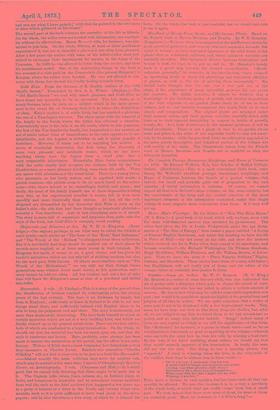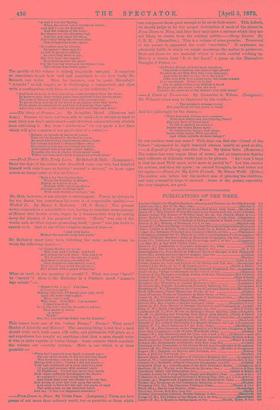Pont. — Songs for Sailors. By W. C. Bennett. (H. S. King.)
Mr. Bennett is a writer of some literary skill, who has cultivated the art of poetry with a diligence which puts to shame the crowd of care- less rhymesters, and who has not failed to attain a certain amount of success. He has in fact what may be called a respectable reputation as a poet ; nor would it be possible to speak too highly of the general tone and purpose of all that he writes. We are quite conscious that a writer of some note is not to be dismissed with a few depreciatory words. Nay, more, we have done our best to like these Songs for Sailors, but, after all, we are obliged to say that we found them to be but second-rate as poetry, and as songs very inferior indeed. " Songs " indeed many of them are not, extend as widely as we will the significance of that term. The "Boat-race," for instance, is a poem in blank verse—and as far as versification is concerned, as good as anything in the volume—wherein some one tells the story how he won his wife by winning a boat-race. By the way, if we know anything about sailors, we should say that they would scarcely approve of the transaction. In truth, the man did not win the race. The thing, to use a sporting phrase, was "squared." A rival is winning, when the hero, in the very crisis of the conflict, finds time to address him in these words :— " • Oh! if you loss, I answered, you but lose A week's wild triumph, and its praise and pride ; I losing, lose what priceless years of joy! Perchance& life's whole sum of happiness,— What years with her that I might call my wife! Winning, I win her:" Poets have a licence in such matters, but this transcends all that can possibly be allowed. We note this because it is, in a way, a specimen of the whole book, of which what are really 'songs' form but a small part. We wish indeed that there were more of them, for some of them are certainly good. Here, for instance, is "A Wife's Song ":—
"0 well I love the Spring, When the sweet, sweet hawthorn blows ; And well I love the Summer', And the ootning of the rose: But dearer are the changing leaf, And the year upon the wane, For 0 they bring the blessed time That brings him home again !
"November may be dreary, December's days may be As full of gloom to others, As once they were to me ; Bet, 0 to hear the 'tempest Beat hard against the pane!
For the roaring wind and the blessed time That brings him home again."
The quality of the volume is indeml singularly unequal. - It surprises 118 Sometimes to see how well and sometimes to see how badly Mr.
Bennett can write. How, for instance, can he quote Macaulay's " Armada " at full length, as if challenging a comparison, and then write a continuation with lines so weak as the following ?- "And hour on hour, in boat and sloop, come speeding from the shore, In haste to play their Valiant pasts, unnumbered brave hearts more; The sons of famous fathers, they came with courage true, To prove them worthy of the blood from mighty sires they drew; From many an inland castle awl hall and grange they came, Afire they came to strike with all for Queen and land and fame."
-,---"The Story of Pomona, 6w. By Aristyllns Hazel. (Harrison and Sons.) Pomona we have not been able to read—it is always so hard to read what you don't understand—and therefore consciehtiously abstain from criticising it. But from Arbitration" we can quote a few lines which will give a notion of our poet's idea of a satire :—
" Rejoice, ye friends of universal peace, That bloody England is the first to cease.
No more her craven countenance shines down On victims kindled to demand their own; The novel system has restrained her wiles, And totalled ruin from her earlier smiles ; Bounden she lies in chains which never loose, Whilst her blanched cheek displays perpetual truce."
—Peril Proves Who Truly Loves. By Robert B. Holt. (Longtnans). Since the days of the orator who described some one who had deluded himself with vain hopes as having "nursed a meteor," we have come across no image quite so fine as this :—
" Each a fay that fearless flew From the fountain of delight, Riding on a pulse of air, Radiant with a glorious glee— Petting every scowling Care With such worlds of eestacy," &e.
Mr. Holt; however, is not always so extravagant. Fluent he always is, far too fluent, but sometimes his verse is of respectable quality.— Walled In. By Henry J. Bulkeley. (H. S. King.) The present writer remembers a schoolfellow who, having to translate some passage of Homer into heroic verso, began in a business-like way by setting down the rhymes of his proposed version. "Haste "was one of the words, and, no other rhyme presenting itself, "paste" was put down to answer to it. And so one of the couplets appeared thus:—
" And with haste Reduce thy arrows to an iron paste."
• Mr. Berkeley must have been following the same method when he vrrete the following stanza :— " 0 Virgin Mother, be to me Was true, and Ito him; and bold And young we both were. Fair and free We floated down the stream of gold, And *ere so happy,—could it be
Such happiness was merely mould, That just to lure us on was given,— Hell hidden with a game of heaven."
What on earth is the meaning of mould '? What was ever "lured" by " mould "? Here is Mr. Bulkeley in a Pindaric, mood, "numeric lege solutis
" Whete's Sal, I say ? You Jane, If I see you agaiu Making that face, knock your ugly skull .Agin' the wall—that's plain.
Here, take a pull Who likes. Poor Bill! I'm undone!
I liked him first Of all the lads; and he, he said, loved me; That makes it worst.
A spree ?
Maybe!
But, Joe, you said the tieket was for London."
This comes from one of the "other Poems." Poems ! 'What next ? Shades of Aristotle and Horace ! The amazing thing is not that a man should write such stuff—men will write, and publishers will print, as a sad experience has taught us, anything—but that a man should write it who is quite capable of better things. Some sonnets which conclude the volume are carefully written. Here is one which is at least pasgable "When last I pressed your hand, a month ago—
Bet one short month—I did not feel that death Was hovering over you, his cruel breath
Mixing with yours : I mean I did not know,—
Toot talk streamed on in such unbroken flow Of past and present, with untumal touch Of kindliness. I loved you more than much.
Now, when suddenly hat dropped the blow.'- So suddenly !—I look along the past,
And think that hour was meant to be our last, And dream of your last look upon the stairs, And same to have felt the last, last grain of sand Fall with a tear on my reluctant hand, And say, 'It has not happened unawares.'"
—FromDaten to Noon. By Violet Fano. (Longman.) These are love poems of not more than ordinary merit, but as passable as those which our composers deem good enough to be sotto their natisic. This' , indeed, we should judge to be the proper destination of most of the pieces in From Dawn to Noon, and here they may have a stiecess Which they are not likely to obtain from the reading pviblic.—Stray Leaves. By C. E. M. (Macmillan.) This is a volume of some promise. ,rc, several of the poems is appended the word "rewritten." It expresses an admirable habit, in which we would encourage the author to persevere. Here and there we see material which is worth careful werkimg up. Here is a stanza from "It is the Lord," a poem on the Mitaeulcrue Draught of Fishes :—
"Of Power Divine, of Love most manifest, Can earth or heaven one clearer sign afford?
So shall he see Him first who loves him best ; And John be first to cry, 'It is the Lord!'
John sees with love's teen eyes; hit sweet reward Is to see clearly. Peter's is to feel Joy in quick action ;—so without a word He leaps into the water—Ere the keel
Touches the shore he at the Matter's feet cloth kneel."
—A Creed of To-morrow. By Alexander S. Wilson. (Longman.) Mr. Wilson's creed may be expressed by the words,—
" The prophet's dreams reveal But playthings for the priest to vend."
And his philosophy by the stanza,— " What heavenly visions may compare With that which saw the Printing Press?
Did ever Seer of Israel bear To life so mighty an access ?
Delete the vision Moses spies Of tabernacles, knops, and rings; Insert what Jame& Watt specifies, And which unfolds divinest things?"
Do our readers want any more ? Well, they can find the "Creed of the Future" expounded in eight hundred stanzas nearly as good as this, —A Legend of Jersey, and other Poems. By Quien Saba. (Bemrose.) The author has very vague ideas of metre, and an impression thathe may collocate or dislocate words just as he pleases. " Ah ! soon I hope in that far land We'll meet, ne'er more to parted be." Let him correct his notions, and then try again ; on second thoughts, he had better not try again.—Poemsfor My Little Friends. By Minna Wolff. (Kitto.) The author sets before her the modest aim of pleasing the children, and may reasonably hope to succeed. Some of the poems, eepecially- the very simplest, are good..



































 Previous page
Previous page